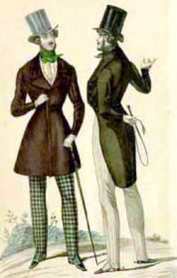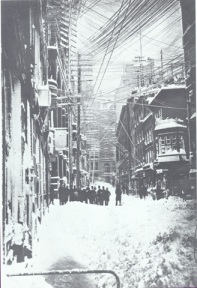 One of the more interesting challenges of writing historical fiction is choosing words appropriate for the time period. Some things are obvious; if you were writing a story set in 1850, you would know not to use a word like ‘metrosexual’ (circa 1994) to describe a dandy (late 18th Century). I find myself constantly looking up the origin of words, and trying to determine first usages. It can be very frustrating when I’m off by only a few years! For example, in my current work-in-progress (Duke of a Gilded Age), the story is set in 1890. I wrote this perfectly lovely exchange:
One of the more interesting challenges of writing historical fiction is choosing words appropriate for the time period. Some things are obvious; if you were writing a story set in 1850, you would know not to use a word like ‘metrosexual’ (circa 1994) to describe a dandy (late 18th Century). I find myself constantly looking up the origin of words, and trying to determine first usages. It can be very frustrating when I’m off by only a few years! For example, in my current work-in-progress (Duke of a Gilded Age), the story is set in 1890. I wrote this perfectly lovely exchange:
“Look, ever since my father died I’ve had no peace,” Wesley replied. “The obituary mentioned his brother the duke, and I’ve been mercilessly mocked and teased around here until I don’t want to hear another word about it! I don’t aspire to be a member of royalty whatsoever.”
Belle’s gaze was unwavering. “You ought to be proud of what you are, Mr. Parker. Although from my perspective, you’re well on the path to becoming a hooligan.”
It occurred to me afterward to look up the word hooligan. Its etymology was mid-1890s… a few years too late for my story! Alas, I had to change the word to delinquent (circa 1475-85), which was perfectly adequate but somewhat less colorful.
My research is not just confined to words, however. I have to make sure to describe my locations the way they were at the moment in time in which my tale takes place. I did extensive research on New York City in 1890, and many landmarks we now take for granted (ie: the Flatiron  Building) did not yet exist. The Statue of Liberty, dedicated in 1886, had not yet begun to oxidize and was still its original dull copper color. In addition, the condition of the city was under rapid flux; any one street could look vastly different from one year to the next. For example, New York used to resemble a spider web with all of its utility wires strung overhead. A blizzard in 1888, however, downed so many wires that havoc ensued. A law requiring burial of these lines had been on the books since 1884, but was ignored by utility companies due to the expense. Mayor Hugh Grant came into office on January 1st, 1889 and gave the utility companies 90 days to comply or have their poles cut down. So the way Manhattan streets looked at the beginning of 1889 might have changed rapidly even within the space of three months!
Building) did not yet exist. The Statue of Liberty, dedicated in 1886, had not yet begun to oxidize and was still its original dull copper color. In addition, the condition of the city was under rapid flux; any one street could look vastly different from one year to the next. For example, New York used to resemble a spider web with all of its utility wires strung overhead. A blizzard in 1888, however, downed so many wires that havoc ensued. A law requiring burial of these lines had been on the books since 1884, but was ignored by utility companies due to the expense. Mayor Hugh Grant came into office on January 1st, 1889 and gave the utility companies 90 days to comply or have their poles cut down. So the way Manhattan streets looked at the beginning of 1889 might have changed rapidly even within the space of three months!
My research is slow and painstaking, but will hopefully pay off. My goal is to finish Duke of a Gilded Age before the end of March. No official release date yet, but I’m shooting for April… something to look forward to other than tax day!
~ S.G. Rogers

One reason I love your books is that I trust that you’ve researched well. Plus, you just have a knack for drawing your readers in. I can’t wait for a new release.
LikeLike
Thanks, Jeff. I try hard to get those details as accurate as possible!
LikeLike
Nice post Suzanne. I had to change a few words in my historical which I was totally convinced were used in that era. I am always checking the eytymology of words and having to rethink the phrases. Good luck with ‘Duke of A Gilded Age’
Susan
LikeLike
That sounds so familiar, Susan! Thanks for reading my post. 😀
LikeLike
Yep, going through this with my WIP. I’m going back to reading the King James during my Bible studies for additional “inspiration.” 😉 It was published 100 years before my setting, so it may be more like the language used. I’m also watching HBO’s John Adams with Paul Giamatti, as it’s about 50 years after. I’m assuming they did their homework on the language to satisfy the critics. 😀
LikeLike
Good idea, Shea. I downloaded a great many books from my era (1890) off Project Gutenberg for the same reason.
LikeLike
Great post, Suzanne. I think it was easier to write my Japanese historical than my regency because with the first, I just had to make sure the actions and situations COULD have happened. But with the regency I had to deal with the proper wording in the dialogue. BTW, finally finished the second Druid book – loved the series!
LikeLike
Thanks, Patty! Writing historical fiction is a little like juggling, isn’t it?
LikeLike